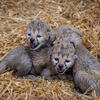Keepers at London Zoo have shared the first images of two adorable new-born porcupines - known as a porcupettes.
Born at the conservation zoo to parents Hettie and Henning on Saturday 14 January, the baby cape porcupines (Hystrix africaeaustralis), one male and one female, have spent their first week snuggling up with their mum in their cosy indoor den.
Zookeeper Veronica Heldt discovered the newborns after monitoring the zoo’s porcupine-cam. She said: “Our new arrivals are developing really well. Although they’re only two weeks old, the nocturnal little ones are already confidently exploring their surroundings and bonding well with their new family.
“We’ve named the precious pair Hector and Hinata; all the porcupines in the family have names starting with the letter ‘H’ so Hector and Hinata join parents Hettie and Henning, nine-month-old Hershey and five-month-old Henry.”
The porcupettes have already had their first health check from the zoo’s vet team and currently weigh a healthy 660g and 750g each. Adult Cape porcupines can reach 15kg, with quills measuring up to 45cm – the same length as a rounders bat.
Veronica added: “Thankfully for mum Hettie, baby porcupines are born with short, soft quills that harden at about one week of age, so labour wasn’t as painful as people might imagine!”
Cape porcupines are nocturnal rodents, native to central and southern Africa. They are the largest of all the porcupine species and Africa’s second largest rodent.
As expert foragers and diggers, Cape porcupines are considered ‘ecosystem engineers’, however increasingly they face threats of habitat destruction and hunting. As well as working to protect threatened species around the world, scientists and conservationists from ZSL, the conservation charity behind London Zoo, work with communities to protect and preserve healthy ecosystems.
Related Members
-
News
 Rare North African cheetah cubs born 4th March, 2026The award-winning Yorkshire Wildlife Park is celebrating conservation breeding success with the birth of four cheetah cubs as part of the Endangered Species…
Rare North African cheetah cubs born 4th March, 2026The award-winning Yorkshire Wildlife Park is celebrating conservation breeding success with the birth of four cheetah cubs as part of the Endangered Species… -
News
 Blog: Why Hosting a BIAZA Conference Matters 3rd March, 2026For this week's blog, Chris Eley (Hertfordshire Zoo) recounts the value of hosting a BIAZA event in 2025: In November 2025, we hosted the BIAZA…
Blog: Why Hosting a BIAZA Conference Matters 3rd March, 2026For this week's blog, Chris Eley (Hertfordshire Zoo) recounts the value of hosting a BIAZA event in 2025: In November 2025, we hosted the BIAZA… -
News
.png?w=100&h=100&zc=1&f=jpeg&hash=97e6d151315c515d23f80e6ee9d1d533) BIAZA Blog: How Accreditation is creating change at BIAZA 25th February, 2026After two years of BIAZA Accreditation, the team delivers a look ahead on the programme to support and boost world-class zoos…
BIAZA Blog: How Accreditation is creating change at BIAZA 25th February, 2026After two years of BIAZA Accreditation, the team delivers a look ahead on the programme to support and boost world-class zoos…


